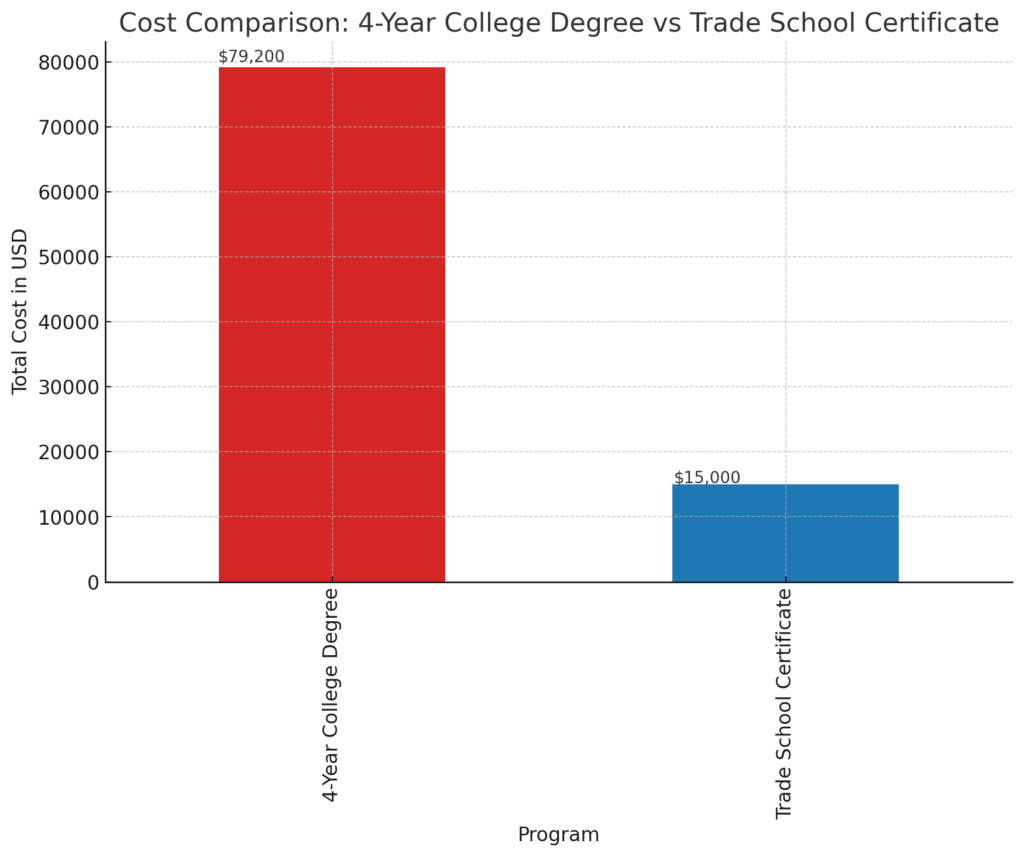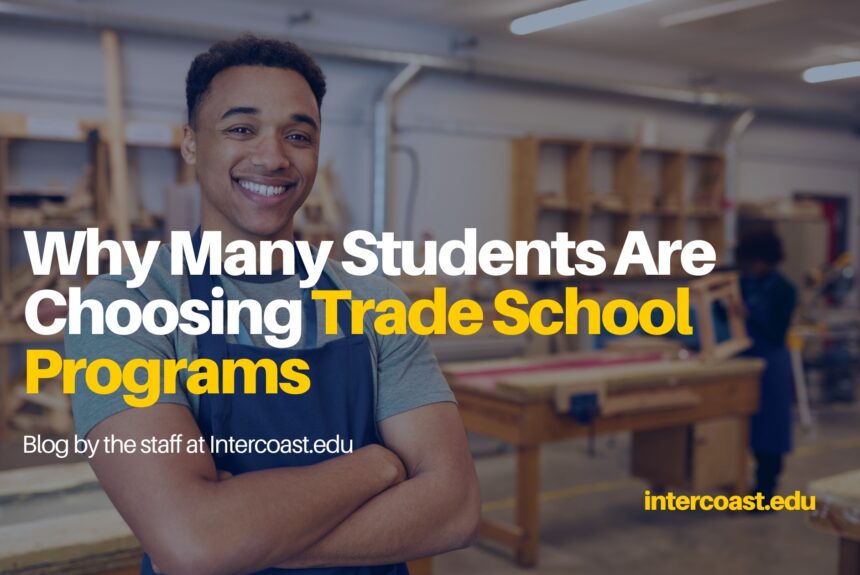Trade schools have gained significant popularity recently as more students seek alternatives to traditional four-year colleges. Offering a range of benefits, including hands-on training and shorter program durations, trade schools are becoming an increasingly attractive option for those eager to enter the workforce quickly and efficiently. This article explores the key features, advantages, and benefits of programs offered at InterCoast Colleges, highlighting why they are an excellent choice for many students.
Features of InterCoast Colleges Programs
Hands-On Training
InterCoast Colleges offer rigorous hands-on training that provides practical experience and prepares students for real-world challenges. This approach aligns with national trends, as 84% of employers believe trade school graduates are better prepared for the workforce compared to college graduates (source) oai_citation: Trade School Statistics Statistics: Market Data Report 2024. Students at InterCoast have access to fully equipped labs managed by industry professionals, ensuring they receive the best possible training.
84% of employers believe that trade school graduates are more prepared for the workforce than college graduates.
Credentials
Many programs at InterCoast Colleges provide credentials that allow students to enter the workforce more quickly than traditional four-year colleges. For instance, courses such as the Electrical Training Program, HVAC Technician, and Alcohol and Drug Counseling are designed to enable students to gain skills needed for entry-level positions in less time. 70% of trade school graduates secure job offers before graduation, making trade schools an increasingly viable option for young adults (source) citation: Trade School Statistics Statistics: Market Data Report 2024.
The average cost of trade school is significantly lower than that of a traditional four-year college.
Tuition Options
InterCoast Colleges offer tuition options, making education more accessible. The institution provides various payment plans and financial aid options to accommodate student needs if a student qualifies. On average, the cost of trade school ranges from $5,000 to $20,000, compared to the rising cost of four-year degrees, which has more than doubled in the 21st century (source) citation: Digest of Education Statistics (NCES.ED.GOV).

Specialized Skill Set
Students at InterCoast Colleges may acquire specialized, market-ready skills tailored to specific industries. Some programs often combine online classes with hybrid formats, ensuring a comprehensive learning experience.
This hands-on approach is crucial, as the demand for skilled trades is expected to grow by 4-5% through 2029, driven by the need for highly trained professionals in fields such as HVAC, solar installation, and electrical work (source) citation: Trade School Statistics Statistics: Market Data Report 2024
The Rise of Trade Schools Among Gen Z
The educational landscape has witnessed a remarkable transformation as trade schools and vocational programs emerge as viable alternatives for pursuing career success. Gen Z, known for their desire for practicality and innovation, is leading this shift. Departing from the conventional college path, many young workers are embracing skilled trades that may offer sustainability, the possibility of rapid career advancement, and potentially lucrative compensation.
The appeal of vocational training lies in its focus on hands-on experience and on-the-job training. These programs are designed to help students gain industry-specific skills, which may help bridge the gap between education and employment. In contrast to the escalating costs associated with four-year college degrees, vocational schools may provide a streamlined, cost-effective alternative, positioning students to potentially enter the workforce more quickly. This practical approach has resonated with a generation increasingly concerned with student debt and uncertain job prospects post-graduation.
Citation: Many in Gen Z ditch colleges for trade schools. Meet the ‘toolbelt generation’ – OPB.
Benefits of Choosing InterCoast Colleges
Career Flexibility
Students trained in vocational professions at InterCoast Colleges have the flexibility to pivot within their industry. Whether entering the electrical industry or advancing in Substance Use Counseling studies, InterCoast Colleges provide the education and support students need to succeed in various career paths. According to a 2024 study, 95% of trade school graduates would recommend vocational education to a friend, highlighting their satisfaction with their career outcomes (source) citation: Trade School Statistics Statistics: Market Data Report 2024.
Programs Offered at InterCoast Colleges
InterCoast Colleges provide a wide range of programs to equip students with the skills needed for various industries. These programs include:
- AAS Degree Business Administration (Online Only)
- AAS Degree Cyber Security (Online Only)
- AAS Degree Substance Use Disorder Counseling (Online Only)
- Alcohol and Drug Counseling Studies (Online Only)
- Behavioral Health Assistant (Online Only)
- Business Office Administration (Online Only)
- Cyber Security Specialist (Online Only)
- Electrical Training Program(Hybrid Program)
- HVAC Technician (Hybrid Program)
- Solar Installation (Hybrid Program)
- Medical Assistant (Hybrid Program)
- Pharmacy Technician (Hybrid Program)
These programs are designed to provide comprehensive training that combines theoretical knowledge with practical skills.
Frequently Asked Questions
What types of programs do InterCoast Colleges offer?
InterCoast College offers a variety of programs in fields such as healthcare, business, and skilled trades. Some of our programs include Electrical Training, HVAC Technician, Medical Assistant, Cybersecurity Specialist, Behavioral Health Assistant, and Alcohol & Drug Counseling Studies. We also offer Associate’s degree programs in Substance Use Disorder Counseling Studies (AAS), Business Administration (AAS), and Cyber Security (AAS). Detailed lists of available career paths can be found on the InterCoast Colleges website.
How long does it take to complete a program at InterCoast Colleges?
Most programs at InterCoast Colleges last from a few months to two years. This allows students to quickly enter the workforce and gain experience sooner than students in traditional four-year programs.
Are there financial aid options for InterCoast Colleges?
Choosing InterCoast Colleges for your education offers a variety of compelling benefits, from hands-on training and short-term credentials to flexible tuition options. The programs at InterCoast Colleges are designed to be comprehensive and practical to prepare graduates are well-equipped to meet employer expectations and thrive in their chosen fields. Whether you’re looking to start a new career quickly or advance in your current one, InterCoast Colleges wants to provide the education and support to achieve your goals.
InterCoast Colleges does not offer scholarships directly. However, various external opportunities are available to students that can help with the cost of education. If students qualify, these may include federal financial aid programs, state grants, and private scholarships.
References:
- National Student Clearinghouse Research Center
- World Metrics 2024 Report
- Apex Technical School Report

